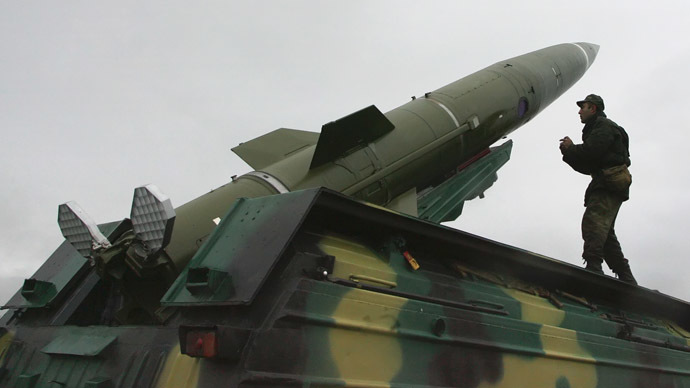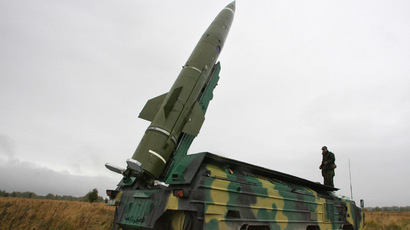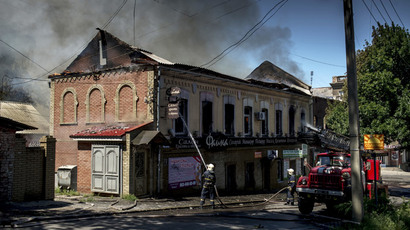Kiev deploying missile launchers, multiple rocket systems near Donetsk - Moscow

Kiev keeps deploying missile launchers, including SS-21 (Scarab) and multiple rocket systems Uragan and Smerch in Donetsk as it “wants to continue the war” in eastern Ukraine, Russia’s Foreign Ministry said in a statement.
“The Ukrainian army continues deploy Tochka U [which NATO refers to as SS-21 or Scarab], Smerch [the BM-30 Tornado] and Uragan [the BM-27] missile complexes to Donetsk. How many more lives will this weapon take? However, the Kiev authorities, it seems, are no longer concerned about the lives of civilians, military and militias. Kiev wants to continue the war,” Russia’s Foreign Ministry said in its statement, which was posted on its website.
Representatives of the Donetsk self-defense forces have also said that the Ukrainian army is “trying to close in on Donetsk, aiming its strikes on Krasnogorovka and Mariynka, which remain under militia control.”
In July, Human Rights Watch accused the Ukrainian army of using Grad missiles to attack densely populated areas in Donetsk.
In its statement, issued July 25, the rights organization said that its “investigation on the ground strongly indicates that Ukrainian government forces were responsible for the attacks that occurred between July 12 and 21,” despite the fact that “Ukrainian government officials and the press service of the National Guard have denied using Grad rockets in Donetsk.”
The ministry stressed that Kiev’s “punitive operation,” which it is carrying out with “the Western regime sponsors’ incitement,” is claiming the lives of innocent civilians and leaving a “significant number of injured.”
“The humanitarian situation is deteriorating in the region,” the Foreign Ministry said. “Despite Russia successive appeals to the Ukrainian authorities and international organizations to take urgent joint action with regard to thehumanitarian disasterand sufferings of the people in the southeast of the country, very little has changed there,” it added.
Kiev is also continuing its crackdown on Russian journalists who have come to the region to cover the situation in eastern Ukraine. The ministry was referred in particular to a recent case when Alina Eprimian, a producer for RT’s video agency Ruptly, was deported from the country.
“The reporter was accused of an attempt to destabilize the situation in the country while shooting [her story] at one of the protests against the mobilization [of the Ukrainian army] in Trans-Carpathia,” the ministry said in its statement.
RT’s video agency producer kicked out of Ukraine
The ministry has stressed the necessity of an “immediate” ceasefire in eastern Ukraine and the “start of negotiations to resolve vital issues of the further state structure of the country.”
The ministerial statement comes as violent clashes are continuing in the Donetsk and Lugansk regions.
In Ukraine, the town of Pervomaysk, one hotspot in the Lugansk Region, is running out of resources due to heavy shelling. One of the recent attacks, on August 2, left the town without gas and water supplies, and without mobile phone connections. Hospital and kindergartens buildings were also damaged.
On the same day a school in Donetsk was targeted, killing one man and one woman.
“In Donbass, an exchange of prisoners and bodies of killed took place between the militias and the Ukrainian security forces. According to militia representatives, the bodies of three out of 12 victims showed signs of torture. In addition, most of the prisoners from militia units had broken bones and all the internal organs were damaged,” the Foreign Ministry said.
Meanwhile, the number of refugees seeking asylum in Russia is growing.
According to information issued Saturday by Russian authorities, “there are 39,265 people, including 12,735 children, living in 537 temporary shelters.”
The UN has estimated that at least 100,000 people have been forcibly displaced since the conflict in Eastern Ukraine began.














